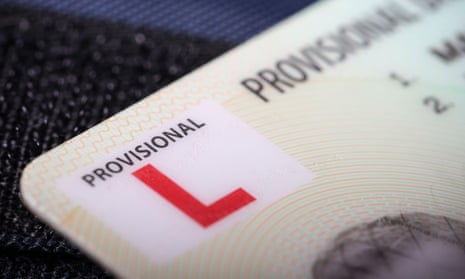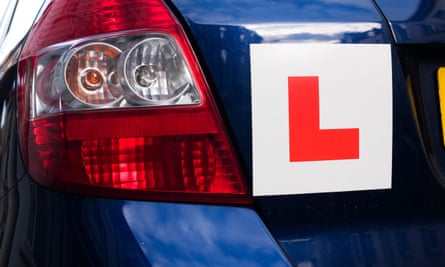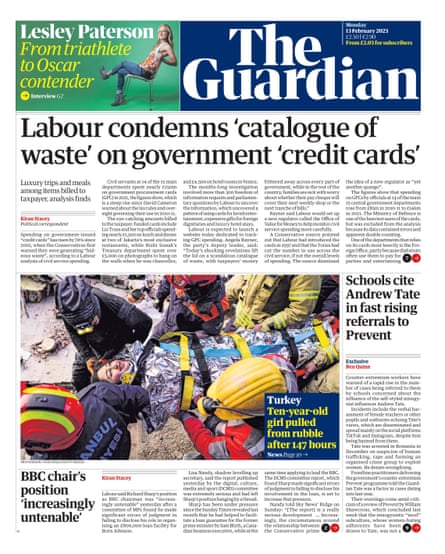Monday briefing: There’s a years-long backlog in driving tests – this is why it matters
In today’s newsletter: Coronavirus has forced tens of thousands to wait longer to take their tests. What seems like a small issue is symptomatic of wider problems in society

Good morning.
For a long time, learning how to drive was a marker of adulthood and the first sign of a transition to full independence. However, like many other traditional indicators of growing up, such as home ownership – or even leaving home in the first place – there are now significant obstacles for young people looking to secure their licence.
While some have chosen to go car-free for environmental reasons, others have decided to opt out because of the rocketing costs of learning how to drive (in 2021 the price for 47 hours of lessons, the amount needed for the average learner, stood between £1,081 and £1,269). There is also the small problem of booking a practical driving test, which has become near impossible over the last three years (last year more than half a million people were on the waiting list to take a test, and that number has only grown).
For today’s newsletter, I spoke to Edmund King, president of the AA, about the impact of this growing issue. That’s right after the headlines.
Five big stories
-
Turkey-Syria earthquake | Turkish authorities have issued more than 100 arrest warrants over collapsed buildings, amid warnings that the death toll from the earthquake could double from 33,000. The step is likely to be seen as an attempt by President Recep Tayyip Erdoğan to deflect blame, with opposition leaders accusing the government of failing to enforce building regulations. Meanwhile in Syria, aid continues to be held up by disputes between the government and rebel groups.
-
BBC | The BBC chairman, Richard Sharp, is under growing pressure after a committee of MPs found he made significant errors of judgment in failing to disclose his role in organising an £800,000 loan facility for Boris Johnson. Reacting to the report, Labour’s Lisa Nandy called Sharp’s position “increasingly untenable”.
-
UK politics | Spending on government-issued “credit cards” has jumped 70% since 2010, when the Conservatives first warned they were generating “hideous waste”, according to analysis by Labour. Spending on the cards by officials at 14 of the main 15 government departments rose from £85m in 2010/11 to £146m in 2021.
-
UK news | Police in Cheshire have arrested a boy and a girl, both 15 years old, on suspicion of murder after the fatal stabbing of Brianna Ghey in Warrington. The 16-year-old was found by members of the public on a path in Linear Park in the village of Culcheth on Saturday afternoon.
-
US news | A fourth flying object over North American airspace has been shot down by the US military. It was first detected above military sites in Montana, and subsequently downed over Lake Huron in Michigan. The Pentagon has said that it posed a threat to civilian aviation and could be a tool for surveillance.
In depth: ‘It’s about more than being mobile – it helps with self-esteem and self-confidence’

The problem
Unlike much of Britain’s public sector in 2023, the issues around learning to drive are relatively new. Edmund King says that, before the coronavirus pandemic, it normally took around six weeks to get a driving test. In November, the Automobile Association sent a freedom of information request to the Driving and Vehicle Standards Agency (DVSA) and found that it now takes over 15 weeks on average – and in some areas jumps to 24 weeks. The backlog also seems to be getting worse. According to the DVSA, the number of those waiting increased by 34,263 in May 2022 compared with the previous year.
The DVSA has implied that the backlog is being exacerbated by unprepared students who are accepting test slots whether they are ready or not, then failing and returning to the waitlist. But King says this is not true: “If you look at the pass rates, they’ve stayed quite similar. Between April and June last year the pass rate [for practical tests] was 48.7% and in 2021 it was 48.9%.” In fact, King points out that in 2007 the pass rate was around 44%.
The impact
These long waiting lists are not just inconvenient – they also negatively affect the outcome of some of the most vulnerable young people in the country. King points to research that the AA conducted alongside the University of Bristol, about the benefits of learning how to drive for care leavers: “It wasn’t just about being more mobile and helping them to get a job, which is really important, but it really helps with their self-esteem and self-confidence,” King says.
The AA has also been working with a charity called Live Unlimited, who have a scheme that provides driving lessons for teenagers in care and care leavers. “Because finding test slots is such a big problem, they’ve got six care leavers at the moment who are test ready, but can’t find a slot anywhere and they are really despondent about it,” says King. And for the lucky few who manage to secure a slot, “they feel more pressure to pass first time, so it’s a double whammy.”
With high demand and limited supply, inevitably third parties try to exploit the situation and there have been a number of reports that certain companies have been bulk-booking tests and then selling them on for a profit, sometimes for three times the original price.
People have been forced to travel for miles to do their tests in other cities, sometimes across the country because of a driving test postcode lottery that’s emerged. “If you’re in Kent, and you’re looking for a test in Canterbury recently the waiting list was only about two weeks,” says King. “But if you’re eight miles away in Herne Bay, it was 22 weeks.”
It’s not just driving …
There is a general sense of inertia and stagnation over a broad range of public services in the UK that are dealing with backlogs that have made life difficult for the public. The lack of driving tests is perhaps the tip of the iceberg: it now takes about 10 weeks to renew a passport, with hundreds of thousands of people last year experiencing further delays in receiving their documents. Figures from the Department for Work and Pensions show that claims for personal independence payment (Pip) benefits were taking 16 weeks to process. The backlog in the crown courts has meant that 75,000 defendants were awaiting trial in October last year, with Max Hill, the director of public prosecutions, saying that reducing that number to 53,000 by 2025 would be a challenge. Meanwhile, the backlog of asylum seekers awaiting an initial decision on their application has surged to 143,377, leaving them in temporary accommodation and unable to work.
The government has been pointing to the pandemic and increasing demand in public services as the reason behind this pile-up. But the combination of harsh austerity measures that have hacked away at the capacity for government departments to run efficiently, antiquated IT systems and overworked staff has led to public infrastructure that is buckling under pressure.
Compared with the NHS, social care and immigration, driving might not seem that important, but King stresses that – especially for people who don’t live in cities – the current backlog has had a real and detrimental effects on their lives. “It’s diminishing their mobility prospects and employment prospects,” he says, as well as taking away something more intangible, in this case “a sense of freedom”.
What else we’ve been reading

-
Sean O’Hagan’s interview with Cate Blanchett (above) is absorbing, with Blanchett discussing her controversial, bold, impressive film Tár and the reactions it has attracted. Nimo
-
Eva Wiseman writes from the hospital room where her sister is undergoing treatment, and where even watching a distractingly glossy movie comes with risks. It’s sad, funny and terribly acute about the “little glittering shadow” that hovers over everything when someone you love is so ill. Archie
-
It has been two decades since the single biggest mobilisation of people in human history: 1.5 million people marched in London, millions more took the streets around the world, all to stand against the Iraq war. Tim Adams takes a look at the legacy of this protest in the years since. Nimo
-
Simon Hattenstone wrote a deeply interesting and powerful interview with Munroe Bergdorf, the model, writer and trans activist, for Saturday magazine. “I never saw this part of my life [coming],” she says. “I never planned this far.” Archie
-
As top human genome editing researchers gather for a summit in London, there will be a “ghost at the feast of science”, writes Robin McKie: He Jiankui, jailed in China for changing the genetic makeup of three embryos in an attempt to make children immune to HIV. McKie’s piece is a fine primer on the latest advances and ethical dilemmas in a fascinating field. Archie
after newsletter promotion
Sport

Skateboarding | Olympic bronze medallist Sky Brown (above) has become Britain’s first skateboarding world champion at the age of 14. She won gold in park skateboarding at the world championships in Sharjah on Sunday with a best score of 90.83 from her three runs.
NFL | In one of the most thrilling Super Bowls of all time, the Kansas City Chiefs beat the Philadelphia Eagles 38-35, making them Super Bowl champions for a second time in four years.
Football | In the Premier League, Manchester United beat Leeds 2-0, while Aston Villa suffered another loss, this time to Manchester City 3-1. In the Women’s Super League, Manchester United beat Tottenham 2-1. Meanwhile, after Southampton sacked manager Nathan Jones, Ben Fisher writes that while his tenure was calamitous, it is the club’s hierarchy that must take responsibility for an appointment that “badly backfired’.
The front pages

Welcome to Monday, where the Guardian splash is “Labour condemns ‘catalogue of waste’ on government ‘credit cards’”. “Secret plot to unravel Brexit” – that’s the Daily Mail while the Sun says “Thanks a million” to its readers as “our quake appeal tops £1,000,000”. “Water firms to be spared threat of £250m fines” says the Times while in a similar vein the i reports “Sunak facing Tory rebellion over sewage in UK rivers”. “Care crisis deepens leaving elderly at risk” says the Daily Express, and the Daily Mirror tells of “NHS heroes’ long Covid agony”. There will be a “UK security review over Chinese spy balloons” the Daily Telegraph tells us, while the top story in the Financial Times is “China balloons cross Taiwan airspace ‘very frequently’”. “It’s a murky business” – get hold of the Metro if you want to read about pressure on the BBC chairman, Richard Sharp, to stand down.
Today in Focus

How a new treatment for diabetes offers hope for millions
The development of an ‘artificial pancreas’ could revolutionise the daily lives of people living with type 1 diabetes. Now the technology could be made available to more than 100,000 people in the UK on the NHS
Cartoon of the day | Edith Pritchett

Sign up for Inside Saturday to see more of Edith Pritchett’s cartoons, the best Saturday magazine content and an exclusive look behind the scenes
The Upside
A bit of good news to remind you that the world’s not all bad

The Absolut Swap Shop is just the latest example of the boom in preloved fashion in the UK. Sustainability influencer Venetia La Manna, body positivity campaigner Nyome Nicholas-Williams and celebrity stylist Harry Lambert came together to pick items for customers at the London pop-up shop, who had the chance to swap anything from their wardrobe for another piece of “deadstock” (clothes that were never sold in the first place) or secondhand clothing. Driven by Gen Z shoppers, the growth in the popularity of preloved clothes is both a rejection of one of the most polluting industries on the planet and an indication of changing consumer behaviour. More and more people are engaging in the circular economy – selling or swapping clothes they no longer wear – meaning that more garments stay out of landfill, with more young people also making money on their own terms by reselling clothes online.
Sign up here for a weekly roundup of The Upside, sent to you every Sunday
Bored at work?
And finally, the Guardian’s crosswords are here to keep you entertained throughout the day – with plenty more on the Guardian’s Puzzles app for iOS and Android. Until tomorrow.
